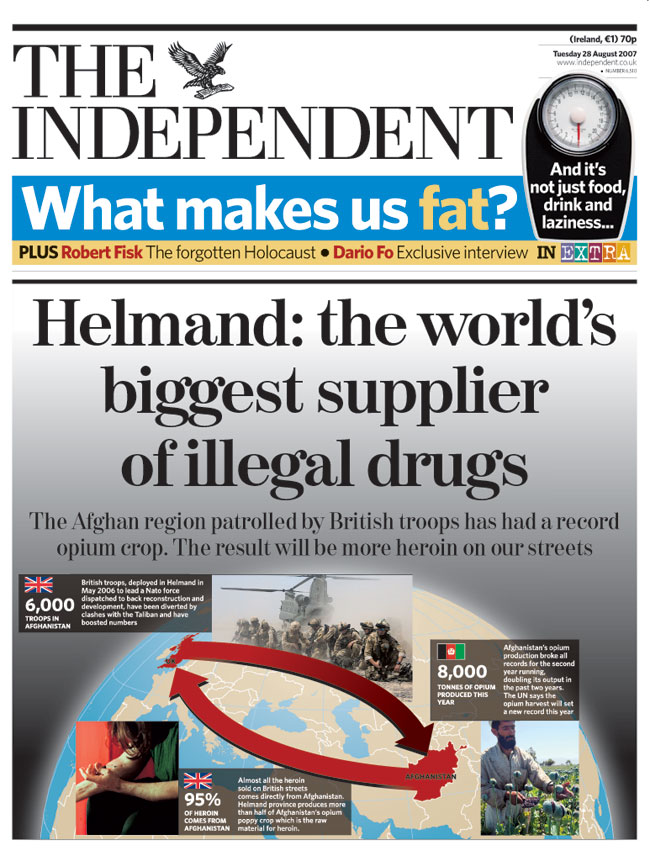The War on Drugs
illegal money props up global economy, funds covert wars
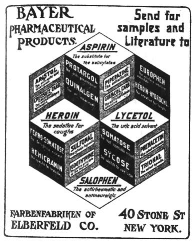

Mission Accomplished: Afghan heroin soars to record levels
www.telegraph.co.uk/news/main.jhtml?xml=/news/2007/08/28/wafghan128.xml
Afghanistan's opium crop doubles in two years
Last Updated: 1:52am BST 28/08/2007
Afghanistan's opium crop has doubled in two years to a new high, with the country almost the sole supplier of the world's deadliest drug, the United Nations said yesterday.
Production was estimated to have increased by 34 per cent this year with the number of laboratories also increasing, the UN said in its Annual Opium Survey.
posted to
www.mikeruppert.blogspot.com
Thursday, October 12, 2006
www.blogger.com/comment.g?blogID=22903415&postID=116065383125633757
Chris Shaw, feral metallurgist said...
Did you ever consider the utter idiocy of rendition flights? A whole fleet
of aeroplanes burns tons of fuel carting poor patsies to and fro between
"secret" prisons all over the world. Few or none of the prisoners
ever end up being charged with anything. So we are asked to believe that
this is the result of misguided or over-zealous intelligence agents in
the "war on terror".
Isn't it far more likely that rendition flights are actually part of the
narcotics highway? We know that those flights pass through almost every
country uninspected and officially "non-existent".
Those of us who realise that the incarceration of Australia's David Hicks
makes no sense, must look elsewhere for a plausible justification for
the Guantanamo facility.
As a US owned "island" of lawlessness i.e. beyond the jurisdiction
of US lawmakers, Guantanamo makes perfect sense if it is looked at as
a major node in a CIA drug network. Small wonder the Administration twists
and turns in it's efforts to hang on to it's hapless "terrorists",
against world opinion. The facade must be preserved at all costs.
Keep on keepin' on Mike.
Love from Australia.
Gary Webb - best memorials
Gary Webb was a journalist for the San Jose Mercury News in 1996 when he wrote a series of articles about the CIA's role in the cocaine trade during the US's proxy war against Nicaragua in the 1980s (detailing how the "contra" terrorists backed by the US were funded in part by drug running). Webb's research detailed how this was a major cause of the crack epidemic in the inner cities. While it was not exactly news that CIA operatives, proxy forces, agents and other types of employees had been involved in international drug running to finance covert operations -- similar activities were rampant during the Vietnam war (among others) -- it was the first time that an article like this in a newspaper had such a national impact due to the story's placement on the paper's website. In the weeks after its publication, the series became extremely popular nationwide, especially in the African-American communities hit hardest by crack cocaine. The furor reached such a crescendo that the director of the CIA, John Deutsch, made a surreal, unprecedented trip to a high school auditorium in Watts, Los Angeles. This meeting is when Michael Ruppert first reached a national audience by confronting CIA Director Deutsch about first hand knowledge of officially sanctioned drug running. This encounter is described in "Crossing the Rubicon" and the video footage is included in "The Truth and Lies of 9/11," both available from Ruppert's From the Wilderness website.
It was not a surprise to astute viewers of the American political system that Gary Webb would suffer personally for daring to tell the truth (an occupational hazard throughout most of recorded history). He was attacked by the national media plus the most co-opted factions of the liberal "alternative" media (ie. The Nation) and pushed out of the newspaper business, essentially unemployable. He published a book "Dark Alliance" about his evidence and his banishment. Most important, the CIA provided a tacit admission in 1998 that confirmed the basic points of Webb's writing, but by then he'd already been squeezed out of the Mercury News.
Here are the best tributes toward his life on the occasion of his tragic death.
http://realhistoryarchives.blogspot.com/2004/12/gary-webbs-memorial-service.html
Lisa Pease's tribute
www.fromthewilderness.com/free/ww3/122004_goodbye_giant.shtml
Mike Ruppert's tribute, plus an exposure of fraudulent reporting by Alex
Jones and others falsely alleging murder
(family members are adamant that it really was suicide, but one must accuse
the corporate media of contributing to it due to their ostracism of Webb
from the world of journalism)
http://narcosphere.narconews.com/story/2004/12/15/184725/08 - NarcoNews editor Al Giordano has especially insightful commentary on the pressures faced by "authentic journalists"
www.fromthewilderness.com/free/ww3/121304_gary_webb.shtml
GARY WEBB - PULITZER PRIZE WINNER, AUTHOR OF DARK ALLIANCE CIA-DRUG SERIES
DEAD OF REPORTED SUICIDE
Press Accounts Fail to Mention His Vindication by CIA Inspector General
Reports and Congressional Investigations
by Michael C. Ruppert
http://rigorousintuition.blogspot.com/2004/12/blood-oil-and-gary-webbs-death.html
http://prorev.com/2004/12/gary-webb-story-you-wont-read.htm
www.consortiumnews.com/2004/121304.html
America's Debt to Journalist Gary Webb
By Robert Parry
December 13, 2004
In 1996, journalist Gary Webb wrote a series of articles that forced a long-overdue investigation of a very dark chapter of recent U.S. foreign policy – the Reagan-Bush administration’s protection of cocaine traffickers who operated under the cover of the Nicaraguan contra war in the 1980s.
For his brave reporting at the San Jose Mercury News, Webb paid a high price. He was attacked by journalistic colleagues at the New York Times, the Washington Post, the Los Angeles Times, the American Journalism Review and even the Nation magazine. Under this media pressure, his editor Jerry Ceppos sold out the story and demoted Webb, causing him to quit the Mercury News. Even Webb’s marriage broke up.
On Friday, Dec. 10, Gary Webb, 49, died of an apparent suicide, a gunshot wound to the head.
Whatever the details of Webb’s death, American history owes him a huge debt. Though denigrated by much of the national news media, Webb’s contra-cocaine series prompted internal investigations by the Central Intelligence Agency and the Justice Department, probes that confirmed that scores of contra units and contra-connected individuals were implicated in the drug trade. The probes also showed that the Reagan-Bush administration frustrated investigations into those crimes for geopolitical reasons.
http://news.bbc.co.uk/2/hi/americas/3977503.stm Friday, 5 November, 2004 Name: Gary Webb |
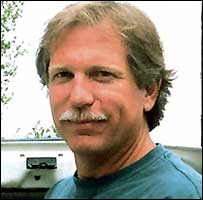 |
| I can't remember who said it but the phrase
"people get the government they deserve" keeps running through
my mind today. What this election tells me, unfortunately, is that
it doesn't matter to most Americans if their government lies to them
repeatedly. They no longer care if their leaders erode their civil
liberties, push this country further towards a police state, or shroud
their actions in additional layers of official secrecy. They don't mind if their government operates strictly for the benefit of the rich and the corporate class, as long as their own taxes don't go up. Nor do they care if their government spends itself to the brink of bankruptcy. As long as they feel threatened by some external evil, everything is permitted. Since the Bush administration did all of this and more, and still won re-election, my suspicion is that things will only get worse over the next four years. Bush no longer has the threat of voter disapproval hanging over his head. He is free to pursue his agenda without restraint. And now, I think, we will find out just how extreme that agenda is. Anyone who thought the last four years were bad hasn't seen anything yet. |
|
www.realhistoryarchives.com/collections/denied/contracocaine.htm
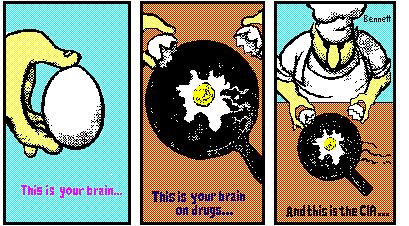
"The United States is the centre of international
money laundering. That is because laundering money is the dark side of
free capital flows. Being hooked on the money of cross-border criminals
is a terrible addiction."
"Taking starch out of laundries," Editorial, Bangkok Post, July
11, 2000
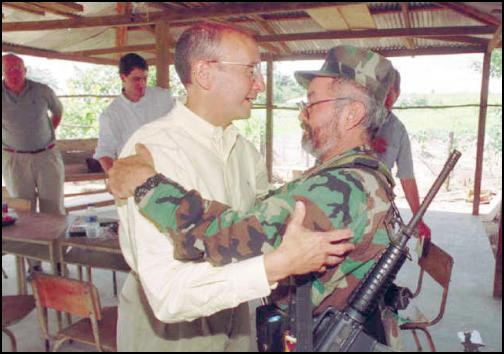
New York Stock Exchange (NYSE) Chairman Richard Grasso with a FARC Commmander
(Columbian guerrilla leader)
www.narconews.com/narcodollars1.html
October 24, 2001
Narco News 2001
Narco-Dollars for Beginners
"How the Money Works" in the Illicit Drug Trade
Part I in a Series
By Catherine Austin Fitts
A Real World Example:
NYSE's Richard Grasso and the
Ultimate New Business "Cold Call"
Lest you think that my comment about the New York Stock
Exchange is too strong, let's look at one event that occurred before our
"war on drugs" went into high gear through Plan Colombia, banging
heads over narco dollar market share in Latin America.
In late June 1999, numerous news services, including Associated Press,
reported that Richard Grasso, Chairman of the New York Stock Exchange
flew to Colombia to meet with a spokesperson for Raul Reyes of the Revolutionary
Armed Forces of Columbia (FARC), the supposed "narco terrorists"
with whom we are now at war.
The purpose of the trip was "to bring a message of cooperation from
U.S. financial services" and to discuss foreign investment and the
future role of U.S. businesses in Colombia.
Some reading in between the lines said to me that Grasso's mission related
to the continued circulation of cocaine capital through the US financial
system. FARC, the Colombian rebels, were circulating their profits back
into local development without the assistance of the American banking
and investment system. Worse yet for the outlook for the US stock market's
strength from $500 billion - $1 trillion in annual money laundering -
FARC was calling for the decriminalization of cocaine.
To understand the threat of decriminalization of the drug trade, just
go back to your Sam and Dave estimate and recalculate the numbers given
what decriminalization does to drive BIG PERCENT back to SLIM PERCENT
and what that means to Wall Street and Washington's cash flows. No narco
dollars, no reinvestment into the stock markets, no campaign contributions.
It was only a few days after Grasso's trip that BBC News reported a General
Accounting Office (GAO) report to Congress as saying: "Colombia's
cocaine and heroin production is set to rise by as much as 50 percent
as the U.S. backed drug war flounders, due largely to the growing strength
of Marxist rebels"
I deduced from this incident that the liquidity of the NY Stock Exchange
was sufficiently dependent on high margin cocaine profits (BIG PERCENT)
that the Chairman of the New York Stock Exchange was willing for Associated
Press to acknowledge he is making "cold calls" in rebel controlled
peace zones in Colombian villages. "Cold calls" is what we used
to call new business visits we would pay to people we had not yet done
business with when I was on Wall Street.
I presume Grasso's trip was not successful in turning the cash flow tide.
Hence, Plan Colombia is proceeding apace to try to move narco deposits
out of FARC's control and back to the control of our traditional allies
and, even if that does not work, to move Citibank's market share and that
of the other large US banks and financial institutions steadily up in
Latin America.
Buy Banamex anyone?
The prohibition on drugs is essential to the health of the economy. Without
prohibition, insurance companies would be smaller and less profitable.
The magistrates, judges, lawyers, police and prison officers and foreign
prison owners would be twiddling their thumbs. Hospitals would be closing
down surplus beds. Suppliers of house security paraphernalia would be
out of business. Counsellors and therapists would have to find other work.
Purveyors of electronic equipment would be deprived of the business that
comes from replacing stolen video recorders and computers.
In short, decriminalising drugs would lead to widespread economic collapse
and alarm. And the Mr Bigs of the business would have to get real jobs.
In fact, if you really wanted to give the economy a Keynesian boost, and
you were starting with a clean slate, you might very well come up with
the proposal to outlaw drugs. That simple piece of legislation would set
in motion an economic juggernaut.
Decriminalise, and let society go to pot
By Terry Lane
November 23, 2003
www.theage.com.au/articles/2003/11/22/1069027376668.html?from=storyrhs
http://mediafilter.org/caq/CIA_Dope_Calypso.html
CIA Dope Calypso
by
Allen Ginsberg
Where The Narcodollars Go
By Ed Rippy
http://erippy.home.mindspring.com/Where_the_NarcoDollars_Go.html
www.fromthewilderness.com/free/ww3/030103_opium.html
Let's see now...
The Taliban in Afghanistan destroys their entire opium crop in January
of 2001.
The United States bombs, attacks and has occupied Afghanistan since Oct
2001.
Now Afghanistan is the top heroin producer...
Hmmm...it's not about controlling drug profits, or is it?
- From The Wilderness
The Lies About Taliban Heroin
www.fromthewilderness.com/free/ww3/10_10_01_heroin.html
US Government Admits - Afghan Production of Heroin is Up, Now That "We" Are In Control
www.cnn.com/2003/ALLPOLITICS/11/28/afghanistan.drugs.reut/index.html
U.S. : Afghan poppy production doubles
Friday, November 28, 2003 Posted: 1:34 PM EST (1834 GMT)
WASHINGTON (Reuters) -- Poppy cultivation in Afghanistan doubled
between 2002 and 2003 to a level 36 times higher than in the last year
of rule by the Taliban, according to White House figures released
Friday.
The area planted with poppies, used to make heroin and morphine,
was 152,000 acres in 2003, compared with 76,900 acres in 2002 and 4,210
acres in 2001, the White House Office of National Drug Control Policy
said in a statement.
The Taliban was cracking down on poppy production in the year
before the U.S. military drove the movement out of office in late 2001 in response to its friendship and cooperation with the al Qaeda organization
of Osama bin Laden.
The new Afghan government, led by President Hamid Karzai, has not been
able to impose its will in many areas of the country, which remain under
the control of warlords.
The White House statement said, "A challenging security situation
... has complicated significantly the task of implementing counternarcotics
assistance programs and will continue to do so for the immediate future."
"Poppy cultivation in Afghanistan is a major and growing problem.
Drug cultivation and trafficking are undermining the rule of law and putting
money in the pocket of terrorists," it added, quoting office director
John Walters.
The U.S. figures differ significantly from those released a month
ago by the United Nations, which estimated that poppy cultivation rose
8 percent in 2003, to 200,000 acres from 185,000 in 2002.
The White House said the United Nations used a different method, based
a mixture of ground surveys and analysis of imagery from commercial satellites.
The U.S. estimates are based on a sample survey of Afghan agricultural
regions conducted with specialized U.S. government satellite imaging systems,
it added.
The United States and the United Nations also gave different estimates
for Afghanistan's opium production in 2003. The United Nations
said it would rise 6 percent to 3,600 metric tons, while the White House
said 2003 output would be 2,865 metric tons. The United States
did not give a 2002 figure.
Opium production complicates the task of restoring central government
authority in Afghanistan because it enables the warlords to run small
armies and gives them an extra financial incentive to retain their autonomy.
http://www.katv.com/news/stories/0204/125194.html
Police Say $30 Million in Cocaine Found Amid Toys in Truck
Tuesday February 10, 2004 2:45pm
Forrest City (AP) - Police found an estimated $30 million worth of
cocaine hidden among a tractor-trailer full of toys headed for Wal-Mart
stores in North Carolina.
State police pulled over a tractor-trailer Sunday on Interstate 40 near
Forrest City, saying it was speeding.
Troopers said the truck's driver was cited for driving on a suspended
license and that he and a passenger appeared nervous during the traffic
stop, so officers asked for permission to search the rig.
According to police, officers found cocaine inside 12 boxes, each containing
about 25 kilograms. The total weight of the drugs is estimated at 660
pounds. Two men remain in custody with bond set at $2 million.
Copyright 2004 by The Associated Press.
U.S. ONLY DEVELOP COUNTRY TO EXCLUDE HEMP FROM AGRICULTURAL PRODUCTION
http://www.norml.org/index.cfm?Group_ID=6403
NORML - The United States is the only developed nation that fails to
cultivate industrial hemp as an economic crop, according to
Congressional Resource Service (CRS) report published last week. Hemp
is
a distinct variety of the plant species cannabis sativa that contains
only minute (less than 1%) amounts of tetrahydrocannabinol (THC), the
primary psychoactive ingredient in marijuana. Farmers worldwide grow
hemp commercially for fiber, seed, and oil for use in a variety of
industrial and consumer products, including food.
"In all, more than 30 countries in Europe, Asia, and North America
grow
hemp," the report states, adding that the European Union instituted
a
subsidy program in the 1990s for hemp fiber production. "The United
States is the only developed nation in which industrial hemp is not an
established crop."
Federal law makes no distinctions between cannabis and industrial hemp,
and makes it illegal to grow hemp without a license from the US Drug
Enforcement Administration (DEA). According to the CRS, "The DEA
has
been unwilling to grant licenses for growing small plots of hemp for
research purposes," even when such research is authorized by state
law,
because the agency believes that doing so would "send the wrong message
to the American public concerning the government's position on drugs."
As an example, the report notes that the DEA "has still not ruled
on an
application submitted in 1999 by a North Dakota researcher" to grow
a
trial plot of hemp in compliance with state law. More than a dozen
states have enacted laws authorizing the licensed cultivation of hemp
for research purposes.
"The federal ban on hemp cultivation and production is a direct
outgrowth of the government's absurd war on cannabis," NORML Executive
Director Allen St. Pierre said. "This report should help to galvanize
support among US farmers, industrialists, and environmentalists for the
legalization and regulation of hemp as an agricultural commodity."
For more information, please contact either Allen St. Pierre or Paul
Armentano of NORML at (202) 483-5500. The CRS report, entitled "Hemp
as
an Agricultural Commodity," is available online at:
http://www.fas.org/sgp/crs/RL32725.pdf





